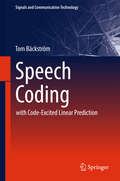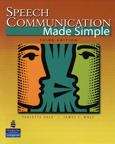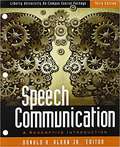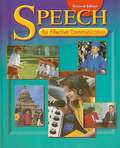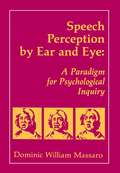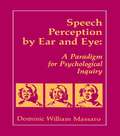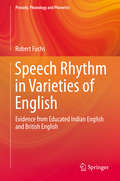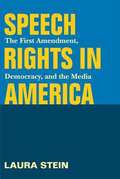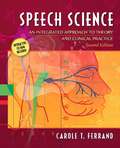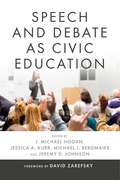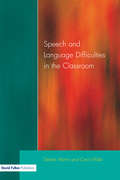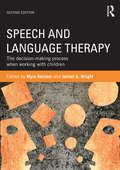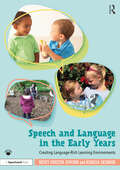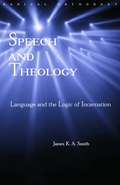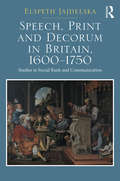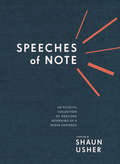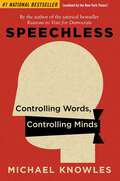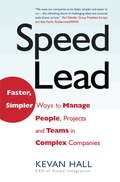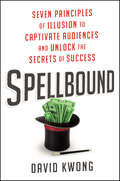- Table View
- List View
Speech Bubbles 2 User Guide: Supporting Speech Sound Development in Children (Speech Bubbles 2)
by Melissa PalmerThis book is the supporting guide for Speech Bubbles 2, an exciting series created for speech language therapists and pathologists, parents and caregivers, teachers and other professionals working with children who have delayed or disordered speech sound development. The guide contains detailed notes to support the effective use of all of the picture books in the series, targeting the following sounds: /v/, /z/, /sh/, /ch/, /h/, /y/, /j/, /r/, /l/, /w/, /r/ blends and /l/ blends. Speech Bubbles 2 is the second set in a series of picture books designed to be used by those working with children who have delayed or disordered speech sound development, children receiving speech therapy or those wanting to provide sound awareness activities for children. The set includes 12 beautifully illustrated storybooks, each targeting a different speech sound in different positions within words, and a user guide with notes on each individual story. Designed to be read aloud to the child in a therapy, classroom or home setting, the stories create a fun and engaging activity that can be returned to again and again. The full set includes: Twelve bright and engaging stories targeting the following early developing sounds and sounds frequently targeted in speech therapy: /v/, /z/, /sh/, /ch/, /h/, /y/, /j/, /r/, /l/, /w/, /r/ blends and /l/ blends. A user guide supporting the use of the stories, with individual notes on each. Perfect not just for therapy but also for encouraging early sound awareness and development, this is an engaging and invaluable resource for speech language therapists and pathologists, parents and caregivers and teachers working with children aged 2–8 years.
Speech Coding
by Tom BäckströmThis book provides scientific understanding of the most central techniques used in speech coding both for advanced students as well as professionals with a background in speech audio and or digital signal processing. It provides a clear connection between the Why’s?, How’s?, and What’s, such that the necessity, purpose and solutions provided by tools should be always within sight, as well as their strengths and weaknesses in each respect. Equivalently, this book sheds light on the following perspectives for each technology presented: Objective: What do we want to achieve and especially why is this goal important? Resource / Information: What information is available and how can it be useful? Resource / Platform: What kind of platforms are we working with and what are the capabilities/restrictions of those platforms? This includes properties such as computational, memory, acoustic and transmission capacity of devices used. Solutions: Which solutions have been proposed and how can they be used to reach the stated goals? Strengths and weaknesses: In which ways do the solutions fulfill the objectives and where are they insufficient? Are resources used efficiently? This book concentrates solely on code excited linear prediction and its derivatives since mainstream speech codecs are based on linear prediction It also concentrates exclusively on time domain techniques because frequency domain tools are to a large extent common with audio codecs.
Speech Communication Made Simple (3rd edition)
by Paulette Dale James C. WolfThe book is designed to meet the needs of speech communication students and their teachers around the world. It helps students to develop confidence while speaking before a group.
Speech Communication: A Redemptive Introduction
by Donald H. AlbanSpeech Communication helps Christian college student develop a Biblical understanding of communication and challenges them to apply it to their intended occupations in a way that makes a redemptive difference in the world. It introduces Christian students to public speaking as a mode through which they can engage people in a way that advances what God values.
Speech Communities
by Marcyliena H. MorganWhat makes a speech community? How do they evolve? How are speech communities identified? Speech communities are central to our understanding of how language and interactions occur in societies around the world and in this book readers will find an overview of the main concepts and critical arguments surrounding how language and communication styles distinguish and identify groups. Speech communities are not organized around linguistic facts but around people who want to share their opinions and identities; the language we use constructs, represents and embodies meaningful participation in society. This book focuses on a range of speech communities, including those that have developed from an increasing technological world where migration and global interactions are common. Essential reading for graduate students and researchers in linguistic anthropology, sociolinguistics and applied linguistics.
Speech For Effective Communication
by Holt Rinehart Winston StaffSpeech For Effective Communication includes a number of topics to help the students throughout the syllabus. The main topics are The Communication Process, Interpersonal Relationships, Public Speaking, Democratic Processes among others.
Speech Perception By Ear and Eye: A Paradigm for Psychological Inquiry
by Dominic W. MassaroFirst published in 1987. This book is about the processing of information. The central domain of interest is face-to-face communication in which the speaker makes available both audible and visible characteristics to the perceiver. Articulation by the speaker creates changes in atmospheric pressure for hearing and provides tongue, lip, jaw, and facial movements for seeing. These characteristics must be processed by the perceiver to recover the message conveyed by the speaker. The speaker and perceiver must share a language to make communication possible; some internal representation is necessarily functional for the perceiver to recover the message of the speak.
Speech Perception By Ear and Eye: A Paradigm for Psychological Inquiry
by Jeffry A. Simpson Dominic W. MassaroFirst published in 1987. This book is about the processing of information. The central domain of interest is face-to-face communication in which the speaker makes available both audible and visible characteristics to the perceiver. Articulation by the speaker creates changes in atmospheric pressure for hearing and provides tongue, lip, jaw, and facial movements for seeing. These characteristics must be processed by the perceiver to recover the message conveyed by the speaker. The speaker and perceiver must share a language to make communication possible; some internal representation is necessarily functional for the perceiver to recover the message of the speaker. The current study integrates information-processing and psychophysical approaches in the analysis of speech perception by ear and eye.
Speech Rhythm in Varieties of English
by Robert FuchsThis book addresses the question whether Educated Indian English is more syllable-timed than British English from two standpoints: production and perception. Many post-colonial varieties of English, which are mostly spoken as a second language in countries such as India, Nigeria and the Philippines, are thought to have a syllable-timed rhythm, whereas first language varieties such as British English are characterized as being stress-timed. While previous studies mostly relied on a single acoustic correlate of speech rhythm, usually duration, the author proposes a multidimensional approach to the production of speech rhythm that takes into account various acoustic correlates. The results reveal that the two varieties differ with regard to a number of dimensions, such as duration, sonority, intensity, loudness, pitch and glottal stop insertion. The second part of the study addresses the question whether the difference in speech rhythm between Indian and British English is perceptually relevant, based on intelligibility and dialect discrimination experiments. The results reveal that speakers generally find the rhythm of their own variety more intelligible and that listeners can identify which variety a speaker is using on the basis of differences in speech rhythm.
Speech Rights in America: The First Amendment, Democracy, and the Media
by Laura SteinThe First Amendment is the principle guarantor of speech rights in the United States, but the Supreme Court's interpretations of it often privilege the interests of media owners over those of the broader citizenry. In Speech Rights in America, Laura Stein argues that such rulings alienate citizens from their rights, corrupt the essential workings of democracy, and prevent the First Amendment from performing its critical role as a protector of free speech. Drawing on the best of the liberal democratic tradition, Stein demonstrates that there is a significant gap between First Amendment law and the speech rights necessary to democratic communication, and proposes an alternative set of principles to guide future judicial, legislative, and cultural policy on old and new media.
Speech Science: An Integrated Approach to Theory and Clinical Practice (2nd edition)
by Carole T. FerrandTo demystify a topic that she has found often intimidates students, Ferrand (speech-language-hearing sciences, Hostra U.) breaks the material into explicitly linked units. Taking a systems approach, the author relates scientific concepts to human communicative behavior and clinical "mis" behavior. In addition to covering the standard topics of the nature of sound, the physiological systems involved, models and theories of speech production and perception, and clinical applications, she takes into account the impact on the field of technological advances. Includes review exercises, an extensive glossary, and an appendix of symbols for consonants and vowels. Annotation c. Book News, Inc., Portland, OR (book news. com)
Speech and Debate as Civic Education (Rhetoric and Democratic Deliberation #15)
by J. Michael Hogan Jessica A. Kurr Michael J. Bergmaier Jeremy D. JohnsonIn an era increasingly marked by polarized and unproductive political debates, this volume makes the case for a renewed emphasis on teaching speech and debate, both in and outside of the classroom.Speech and debate education leads students to better understand their First Amendment rights and the power of speaking. It teaches them to work together collaboratively to solve problems, and it encourages critical thinking, reasoned and fact-based argumentation, and respect for differing viewpoints in our increasingly diverse and global society. Highlighting the need for more emphasis on the ethics and skills of democratic deliberation, the contributors to this volume—leading scholars, teachers, and coaches in speech and debate programs around the country—offer new ideas for reinvigorating curricular and co-curricular speech and debate by recovering and reinventing their historical mission as civic education.Combining historical case studies, theoretical reflections, and reports on programs that utilize rhetorical pedagogies to educate for citizenship, Speech and Debate as Civic Education is a first-of-its-kind collection of the best ideas for reinventing and revitalizing the civic mission of speech and debate for a new generation of students.In addition to the editors, the contributors to this volume include Jenn Anderson, Michael D. Bartanen, Ann Crigler, Sara A. Mehltretter Drury, David A. Frank, G. Thomas Goodnight, Ronald Walter Greene, Taylor W. Hahn, Darrin Hicks, Edward A. Hinck, Jin Huang, Una Kimokeo-Goes, Rebecca A. Kuehl, Lorand Laskai, Tim Lewis, Robert S. Littlefield, Allan D. Louden, Paul E. Mabrey III, Jamie McKown, Gordon R. Mitchell, Catherine H. Palczewski, Angela G. Ray, Robert C. Rowland, Minhee Son, Sarah Stone Watt, Melissa Maxcy Wade, David Weeks, Carly S. Woods, and David Zarefsky.
Speech and Debate as Civic Education (Rhetoric and Democratic Deliberation)
by David Zarefsky Jessica A. Kurr Michael J. Bergmaier Jeremy D. Johnson Michael HoganIn an era increasingly marked by polarized and unproductive political debates, this volume makes the case for a renewed emphasis on teaching speech and debate, both in and outside of the classroom.Speech and debate education leads students to better understand their First Amendment rights and the power of speaking. It teaches them to work together collaboratively to solve problems, and it encourages critical thinking, reasoned and fact-based argumentation, and respect for differing viewpoints in our increasingly diverse and global society. Highlighting the need for more emphasis on the ethics and skills of democratic deliberation, the contributors to this volume—leading scholars, teachers, and coaches in speech and debate programs around the country—offer new ideas for reinvigorating curricular and co-curricular speech and debate by recovering and reinventing their historical mission as civic education.Combining historical case studies, theoretical reflections, and reports on programs that utilize rhetorical pedagogies to educate for citizenship, Speech and Debate as Civic Education is a first-of-its-kind collection of the best ideas for reinventing and revitalizing the civic mission of speech and debate for a new generation of students.In addition to the editors, the contributors to this volume include Jenn Anderson, Michael D. Bartanen, Ann Crigler, Sara A. Mehltretter Drury, David A. Frank, G. Thomas Goodnight, Ronald Walter Greene, Taylor W. Hahn, Darrin Hicks, Edward A. Hinck, Jin Huang, Una Kimokeo-Goes, Rebecca A. Kuehl, Lorand Laskai, Tim Lewis, Robert S. Littlefield, Allan D. Louden, Paul E. Mabrey III, Jamie McKown, Gordon R. Mitchell, Catherine H. Palczewski, Angela G. Ray, Robert C. Rowland, Minhee Son, Sarah Stone Watt, Melissa Maxcy Wade, David Weeks, Carly S. Woods, and David Zarefsky.
Speech and Language Difficulties in the Classroom
by Carol Miller Deirdre MartinNow fully updated and revised in the light of recent developments in practice, this book discusses children's language development and language difficulties in the context of the classroom. The book will help the practitioner to understand the range of language difficulties experienced by children and will assist them in planning appropriate activities with pupils, their parents and other education professionals. In particular, this second edition offers further guidance for teachers on observing children's communication skills in school; fully revised and updated chapters, in the light of recent research; advice for schools on the implications of the increased emphasis on language and communication needs in the revised SEN Code of Practice 2001; and discussion about the increasingly recognized links between communication difficulties and EBD.
Speech and Language Therapy: The decision-making process when working with children
by Myra Kersner Jannet A. WrightNow in its second edition, Speech and Language Therapy: the decision-making process when working with children reveals how recent research and changes in health and education services have affected the decision-making process in the assessment and management of children with speech and language problems. With individual chapters written by experts in their field, this book: Illustrates how the decisions made by practitioners may vary within different work settings Shows how these decisions may need to be adapted when working with specific client groups Explores how such decisions are part of effective evidence-based practice Offers an overview of the skills required by the developing professional Provides insight into working as a newly qualified therapist in the current job market. Rigorously underpinned with current research and revised legislation, this is an important textbook for speech and language therapy students, potential students and specialist teachers in training. Speech and Language Therapy: the decision-making process when working with children will also be relevant to newly qualified therapists, therapists returning to the profession, specialist teachers and Special Educational Needs Coordinators.
Speech and Language in the Early Years: Creating Language-Rich Learning Environments
by Rebecca Skinner Becky Poulter JewsonSpeech and Language in the Early Years is an accessible resource, packed full of practical ideas and techniques to support speech and language development in young children. Learning to communicate is a dynamic process. A child needs a reason to communicate, the motivation to communicate, and, significantly, a responsive communication partner. This book will help you to develop language-rich interactions to facilitate language development in your everyday work and will encourage reflective practice in your setting. Key features include: Activities and strategies designed for busy educators to dip in and out of as part of everyday practice, promoting speech and language development as well as supporting those with speech, language, and communication needs Templates and techniques for reflective practice, supporting the creation of language-rich environments and encouraging mindful communication Chapters spanning from birth to the transition to school, each exploring different areas of the learning environment Offering readers the opportunity to extend their skills and confidence in their practice, this book is an essential resource for early years practitioners looking to facilitate quality interactions with the children in their care.
Speech and Theology: Language and the Logic of Incarnation (Routledge Radical Orthodoxy)
by James K.A. SmithGod is infinite, but language finite; thus speech would seem to condemn Him to finitude. In speaking of God, would the theologian violate divine transcendence by reducing God to immanence, or choose, rather, to remain silent? At stake in this argument is a core problem of the conditions of divine revelation. How, in terms of language and the limitations of human understanding, can transcendence ever be made known? Does its very appearance not undermine its transcendence, its condition of unknowability?Speech and Theology posits that the paradigm for the encounter between the material and the divine, or the immanent and transcendent, is found in the Incarnation: God's voluntary self-immersion in the human world as an expression of His love for His creation. By this key act of grace, hinged upon Christs condescension to human finitude, philosophy acquires the means not simply to speak of perfection, which is to speak theologically, but to bridge the gap between word and thing in general sense.
Speech for Effective Communication
by Rudolph F. VerderberSpeech For Effective Communication is divided into 6 units, which are further divided into 22 chapters. Unit 1, containing Chapters 1-5, presents basic speech communication skills. Chapter 1 introduces the field of speech communication. Chapters 2 and 3 acquaint you with the concepts of verbal and nonverbal communication. Chapter 4 covers the vocalization process, and Chapter 5 introduces listening skills. Unit 2, containing Chapters 6-8, presents interpersonal communication skills, including making introductions, giving and receiving directions, using the telephone, engaging in conversations, and taking part in job and college interviews. Unit 3, containing Chapters 9-13, presents public speaking skills. Chapters 9-11 cover speech preparation skills; Chapter 12 discusses diction and effective word choice; and Chapter 13 introduces methods and skills for delivering speeches. Unit 4, containing Chapters 14-16, applies the information presented in Unit 3 to the development of three basic kinds of speeches: informative speech, process speech, and persuasive speech. Unit 5, containing Chapters 17-19, presents group communication skills. Chapter 17 covers group discussion; Chapter 18 introduces debate; and Chapter 19 discusses parliamentary procedure. Unit 6, containing Chapters 20-22, presents the performing arts, including oral interpretation, theater, and radio and television. Following these chapters are an appendix of speeches, a glossary of vocabulary terms, and the index.
Speech, Print and Decorum in Britain, 1600--1750: Studies in Social Rank and Communication
by Elspeth JajdelskaFilling an important gap in the history of print and reading, Elspeth Jajdelska offers a new account of the changing relationship between speech, rank and writing from 1600 to 1750. Jajdelska draws on anthropological findings to shed light on the different ways that speech was understood to relate to writing across the period, bringing together status and speech, literary and verbal decorum, readership, the material text and performance. Jajdelska's ambitious array of sources includes letters, diaries, paratexts and genres from cookery books to philosophical discourses. She looks at authors ranging from John Donne to Jonathan Swift, alongside the writings of anonymous merchants, apothecaries and romance authors. Jajdelska argues that Renaissance readers were likely to approach written and printed documents less as utterances in their own right and more as representations of past speech or as scripts for future speech. In the latter part of the seventeenth century, however, some readers were treating books as proxies for the author's speech, rather than as representations of it. These adjustments in the way speech and print were understood had implications for changes in decorum as the inhibitions placed on lower-ranking authors in the Renaissance gave way to increasingly open social networks at the start of the eighteenth century. As a result, authors from the lower ranks could now publish on topics formerly reserved for the more privileged. While this apparently egalitarian development did not result in imagined communities that transcended class, readers of all ranks did encounter new models of reading and writing and were empowered to engage legitimately in the gentlemanly criticism that had once been the reserve of the cultural elites. Shortlisted for the European Society for the Study of English (ESSE) book prize 2018
Speech-Making
by James A. WinansThere is no entirely satisfactory term to describe our subject. An earlier work of mine is entitled Public Speaking, a term some object to on the ground that public limits the field too much, for we are concerned with speeches addressed to groups of any size, whether audiences of thousands in public halls, or small groups in committee rooms or wherever people meet for discussion with closed doors.
Speeches of Note: An Eclectic Collection of Orations Deserving of a Wider Audience
by Shaun UsherFrom the author of the New York Times bestseller Letters of Note comes a collection of 75 of history's most interesting, profound, and sometimes unknown speeches from a range of scintillating personalities such as Frederick Douglass, Justin Trudeau, Albert Einstein, Meghan Markle, Barbara Jordan, and Ursula K. Le Guin. This thoughtfully curated and richly illustrated collection celebrates oratory old and new, highlighting speeches we know and admire, while also shining a light on profound drafts that were never delivered or have until now been forgotten. From George Bernard Shaw's warm and rousing toast to Albert Einstein in 1930 and the commencement address affectionately given to graduates at Long Island University by Kermit the Frog, to the chilling public announcement (that was thankfully never made) by President Richard Nixon should Neil Armstrong and Buzz Aldrin become stranded on the moon, Speeches of Note honors the words and ideas of some of history’s most provocative and inspiring personages.
Speechless: Controlling Words, Controlling Minds
by Michael Knowles&“Every single American needs to read Michael Knowles&’s Speechless. I don&’t mean &‘read it eventually.&’ I mean: stop what you&’re doing and pick up this book.&” —CANDACE OWENS "The most important book on free speech in decades—read it!&” —SENATOR TED CRUZ A New Strategy: We Win, They Lose The Culture War is over, and the culture lost. The Left&’s assault on liberty, virtue, decency, the Republic of the Founders, and Western civilization has succeeded. You can no longer keep your social media account—or your job—and acknowledge truths such as: Washington, Jefferson, and Columbus were great men. Schools and libraries should not coach children in sexual deviance. Men don&’t have uteruses. How did we get to this point? Michael Knowles of The Daily Wire exposes and diagnosis the losing strategy we have fallen for and shows how we can change course—and start winning. In the groundbreaking Speechless: Controlling Words, Controlling Minds Knowles reveals: How the &“free speech absolutists&” gave away the store The First Amendment does not require a value-neutral public square How the Communists figured out that their revolution could never succeed as long as the common man was attached to his own culture Where political correctness came from How, comply or resist, political correctness is a win-win game for the bad guys Why taking our stand on &“freedom of speech&” helps put atheism, decadence, and nonsense on the same plane with faith, virtue, and reality The real question: Will we shut down drag queen story hour, or cancel Abraham Lincoln? For 170 years the First Amendment was compatible with prayer in public school How the atheists got the Warren Court to rule their way To this day, there&’s a First Amendment exception for obscenity. What exactly is the argument that perverts&’ teaching toddlers to twerk is not obscene? Read Speechless: Controlling Words, Controlling Minds if you want to learn how to take the fight to the enemy.
Speed Lead
by Kevan HallAuthor Kevan Hall believes that up to 50% of employee time is wasted in most offices. Speed Lead offers a simple solution for making companies run faster. Based on research showing that talented people spend more than 80% of their time on cooperation, communication, and control in the workplace, Hall explains the strategies that work for today's successful businesses.
Spellbound: Seven Principles of Illusion to Captivate Audiences and Unlock the Secrets of Success
by David KwongA professional magician and illusionist—the head magic consultant for the hit film Now You See Me—reveals how to bridge the gap between perception and reality to increase your powers of persuasion and influence.David Kwong has astounded corporate CEOs, TED talk audiences, and thousands of other hyper-rational people, making them see, believe, and even remember what he wants them to. Illusion is an ancient art that centers on control: commanding a room, building anticipation, and appearing to work wonders. Illusion works because the human brain is wired to fill the gap between seeing and believing. Successful leaders—like Steve Jobs, Warren Buffett, and Ted Turner—are masters of control and command who understand how to sway opinions and achieve goals.In his years of research and practice, David has discovered seven fundamental principles of illusion. With these rules anyone can learn to:Mind the Gap—recognize and employ the perceptual space between your audience’s ability to see and their impulse to believe.Load Up—prepare to amaze your audience.Write the Script—discover the importance of shaping the narrative that surrounds your illusion.Control the Frame—explore the real life value of a magician’s best friend: misdirection.Design Free Choice—command your audience by giving them agency.Employ the Familiar—take secret advantage of habits, patterns, and audience expectations.Conjure an Out—develop backup plans that will keep you one, two, three, or more steps ahead of the competition.With Spellbound you’ll discover a different way to sell your idea, product, or skills, and make your best shot better than everyone else’s.
Spelling, Vocabulary, and Poetry 6
by Phyllis RandSpelling, Vocabulary, and Poetry 6 teaches students the spelling and meaning of words through the study of prefixes, roots, and suffixes. There are eight review lists and exercises that provide an opportunity for spelling mastery.

